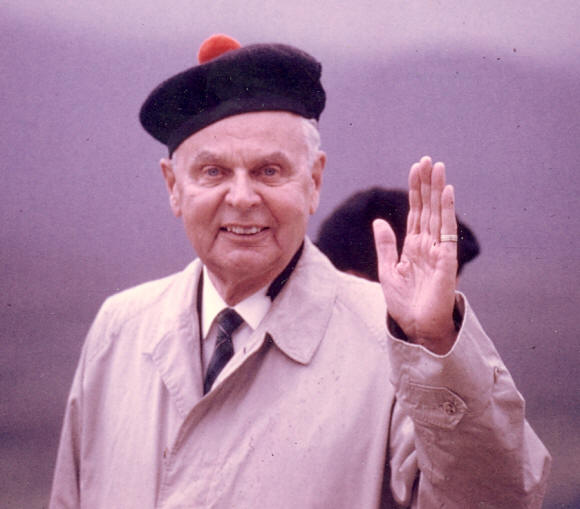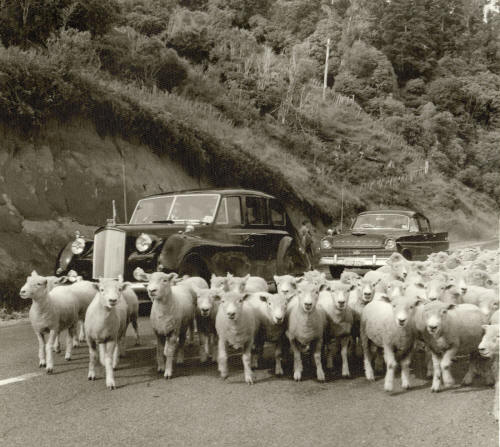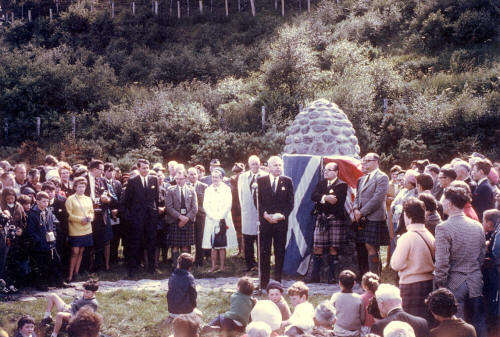|
DIEFENBAKER’S NORTH
New project celebrates
the ‘prairie politician’ who championed international human rights - and
famously clashed with Kennedy.
Helmsdale may be a tiny village on the north east coast of Scotland but
when it comes to linking up with the Commonwealth Games in Glasgow it
more than lives up to its title of Creative Place 2014.
Although the games are a good 500 miles away, Helmsdale’s museum and
heritage centre, Timespan, is marking the occasion with a project called
Diefenbaker’s North based on John Diefenbaker (1895-1979), the 13th
Prime Minister of Canada who was instrumental in creating the New
Commonwealth.
Diefenbaker was a Cold
War Prime Minister in office during some of the most critical moments of
the Nuclear Age (21 June 1957 – 22 April 1963). He was descended from
the Bannerman family who were forced to leave their home in Strath of
Kildonan just outside Helmsdale during the Highland Clearances in 1813.

The Bannermans made the
treacherous Atlantic voyage to Churchill in Canada, before embarking on
the year-long journey overland to the Red River Valley settlement.
Timespan’s Diefenbaker’s North project tells the story of what came
after the Clearances; what happened to those who left Kildonan, and the
lives of their descendants in new countries.
Diefenbaker clearly inherited his family’s pioneering spirit as not only
did he reach high office, he was also instrumental in developing the New
Commonwealth of the post war years, as well as aligning Canada’s trade
policy and foreign affairs with the UK and other Commonwealth nations.
During his first year as Prime Minister in November 1958, Diefenbaker
visited Scotland as part of his global Commonwealth tour, taking time to
make an ancestral pilgrimage to Sutherland as a side-trip to the
official UK visit.

When his official party
arrived in Helmsdale for the weekend, Diefenbaker met up with many local
people in his search for his ancestors’ Kildonan home. Such was the
enthusiasm that the official convoy of eight cars swelled to 23 as
locals followed Diefenbaker up the Strath of Kildonan.
Diefenbaker later
recalled: “All that remains there today is the occasional ruin. The ruin
of my great grandfather’s cottage is still to be seen and is not more
than two or three feet high.
“My great-grandfather
and grandmother became attached to the Selkirk settlement. They had a
very bad time. They were to be disembarked at York Factory but dumped
off at Churchill. My great-grandfather played the bagpipes during the
march to York Factory to keep spirits up.”
Diefenbaker made a return visit to Kildonan in the summer of 1968, this
time in a personal capacity to unveil a plaque dedicated to his
ancestors at Kildonan Church, and also to unveil a memorial cairn in
Rogart to the parents of the first Canadian Prime Minister, John A
MacDonald, who like Diefenbaker was descended from a Kildonan family.

The two families had
lived only miles apart in Kildonan, and in a later interview,
Diefenbaker said: “So if it hadn’t been for the Highland Clearances, the
first and thirteenth Prime Ministers of Canada might not have been.”
Author and historian Jim Hunter who is writing a book on this part of
Clearance history said: “Just before Christmas, in temperatures of
around minus 35 degrees C, I visited Churchill on Hudson Bay where –
exactly 200 years ago – George Bannerman and other refugees from the
Sutherland Clearances were spending the winter.
“It tells you all you
need to know about our landlords that they were responsible for kicking
out of Scotland people of such courage, tenacity and enterprise. But if
their going was our loss, it was very much Canada’s gain. They could
have helped make Scotland a better place. As it was, they took the lead
in turning Canada into one of the modern world’s great countries.”
As for the Kennedy
connection, Kennedy and Diefenbaker were leaders of their respective
North American countries at the same time. The animosity between them
was as personal as it was political - from Kennedy deliberately
mispronouncing Diefenbaker’s surname to the Canadian challenging
Kennedy’s handling of the Cuban missile crisis.
Diefenbaker combined Conservative politics with social justice issues
and during his six years as Prime Minister, his government obtained
passage of the Canadian Bill of Rights and granted the vote to the First
Nations and Inuit peoples. It was Diefenbaker who appointed the first
female minister in Canadian history to his Cabinet, as well as
appointing the first aboriginal member of the Senate.
As the country builds up to the Commonwealth Games in July, what better
time to reflect on this key Canadian statesman of direct Scottish
descent who ‘stood for a fascinating and still relevant combination of
individual and egalitarian values’.
Project Manger Jacquie
Aitken says: “Throughout this year, Timespan is exploring the theme of
‘Remote North’ and the Diefenbaker project will reflect on how
developments in travel, communication and trade have impacted on our
lives since his visits 46 and 56 years ago.
“We’ve struck gold with a wonderful collection of photos of local people
in the Saskatchewan University Archive. These rare archival images will
be revealed for the first time by our project coordinator Jeff Rule at
our launch event.
“We’d love to hear from
anyone with information on Diefenbaker’s visits and Bannermans from
Kildonan. Please call 01431 821327 or email diefenbakers.north@gmail.com
and follow us on Facebook.”
The project launches with a talk in Timespan on Thursday 20 February at
7.30pm followed by an oral history reminiscences session on Saturday 22
February at 11.30am.
The culmination of the project coincides with the Festival of Museums
Weekend (16 to 18 May) with maps encouraging visitors to follow in
Diefenbaker’s Footsteps and travel north. Visitors can also view the
Diefenbaker' North montage at Timespan featuring archival images from
his trips north, interviews with people who met him, and the Diefenbaker
Croft display.
A Diefenbaker 1950’s Highland Hop rounds off the weekend – would ‘Dief
the Chief’ have approved?
Documentary portrait on
politician John Diefenbaker. People on the street comment on his past
performance as prime minister and opposition leader. Journalist Jack
Webster, after a news conference, talks about Diefenbaker's personality
and his accessibility to the news media. On an early morning fishing
trip on Vancouver Island, Diefenbaker jokes with his companions and
recalls historical quips from Canadian politicians. In his office on
Parliament Hill, Diefenbaker comments on the accomplishments of past
prime minister Mackenzie King. Sequences of Diefenbaker walking his dog
in Rockcliffe Park and attending church services with Mrs. Diefenbaker.
On a train from Saskatoon to Prince Albert he recalls his childhood and
early law practice. Diefenbaker speaks to his hometown kinsmen club,
greets townsfolk, and is re-elected leader at the Conservative Party
leadership convention. Back in his office on Parliament Hill he answers
questions from producer Douglas Leiterman.
Part 1 of 4
|
